Student Spotlights: getting to know our CS students
There is no question that the Department of Computer Science is home to amazing faculty, staff, and students. I wanted to provide an opportunity for those inside and outside the department to learn about our students. The Student Spotlight provides a platform to tell our students unique backgrounds, experiences, and stories. After reading, I know that you will agree- our students are incredible.
Thanks for reading! - Martin Marquez, Director of Academic and Support Services
Jade Marmorstein
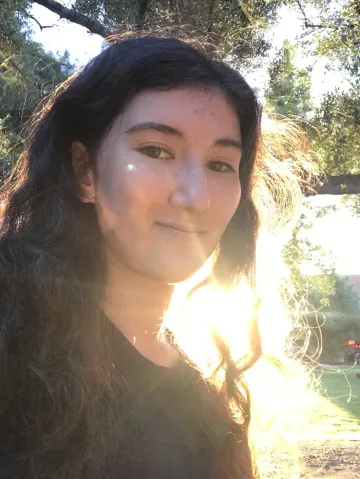
Jade Marmorstein is a senior BS in Computer Science student. Jade is also minoring in 1) Japanese Language, 2)Chinese Studies, and 3)Business Administration. Jade attended HS in Minnesota and decided to attend the University of Arizona because of Tucson's weather, culture and people. Jade is highly involved in the UA Game Development (GameDev) Club, serving as president of the club.
In an interview with Martin Marquez, Jade shared her experience in the CS department:
Question: What excites you about the field/sub-fields in CS?
I think what I love most about CS is that feeling of satisfaction when your code actually works. You can toil for hours, even days or weeks pulling your hair out in frustration and tears as everything breaks and you fix bug after bug - but that rush of satisfaction when you finally hit "run" and it all works just makes it all so worth it. There's something that feels powerful about being able to make the computer do what you want, and when you can go "I told the computer to do a thing and the computer did the thing!" it feels amazing!
Question:What is GameDev Club and why should someone join?
Game Dev Club is a club for all things game development. We're a community for promoting and teaching game development, and we enable students to learn the tools to develop their own projects and skills outside of class. It's a great way to meet and get to know other people with common interests, show off your projects and see what others are working on, and get/give help on learning new tools. We are recognized as the largest CS club on campus, but that doesn't mean we're just a bunch of programmers! Game development encompasses a wide variety of disciplines, and in addition to programming and the technical side of things we've had meetings covering topics like art, audio, animation, design, community management, genre analysis, and more. If it has anything to do with game development, it's welcome! We also welcome all experience levels, so whether you've been making games for years, or have never made a game in your life, there is a place for you!
Our club activities include weekly meetings during the school year, game nights and workshops, and our biggest event is a game jam once every semester. The game jam is a weekend-long hackathon like event where people form teams and create a game over the course of the weekend.
For more information, we also have a website and a discord server.
Question: What advice would you give to someone interested in game development?
My advice is: Make games! The best way to learn is to do it!
My other advice is: SCOPE! Do not set out to make Dark Souls or Sword Art Online. You may have a big grand idea for a game but the reality is big grand games require a big grand amount of time and resources that as a busy CS student you almost certainly don't have. Start small, create a game that is manageable and be flexible with your vision if something is more challenging than you thought or not working out like you thought it would. If you try to learn everything at once it can get overwhelming. Be patient with yourself, and take the time to find and consult resources like tutorials, documentation for game engines, or asking more experienced peers.
CS can also get extremely busy and you may feel you never have the time to devote to personal projects or learning on your own. That's okay! Events like hackathons or game jams are a great way to set aside a small chunk of time - a single weekend, usually - since you can plan ahead to attend such an event, and devote that time to creating something and learning as much as possible! Usually games made in 48 hours are hardly ever complete, but that's okay - I guarantee you will learn a lot, and even if it's not 100% complete it's still a project you can put on your resume/portfolio and that can be a good talking point in interviews with potential employers.
As for actual game dev tools, here are just a few (free!) game engines I personally like and recommend:
Unity - very versatile and can be used for 2D and 3D and just about any game, and has a decent editor interface. But it can be a little intimidating at first and take a while to learn. However there's lots of great tutorials and resources out there to help.
Love2D - Great for folks who already have some basic programming knowledge, this is a framework for making games with the lua programming language. It's just writing code in a text editor - I personally like to use ZeroBrane, an IDE specifically for Lua.
RenPy - this is an engine specifically for making visual novel games. Great for creating more narrative/story-based games and has a python-based language that is easy to learn with little to no prior programming experience.
Twine - similarly to RenPy, this engine requires almost no prior programming experience and is primarily for creating text-based adventures. If you want to get fancy with it though you can use HTML/CSS and Javascript to enrich your twine game.
Question: Why is it important to have a creative outlet? How does the CS field help you with that?
Someone once asked me a similar question about what motivates me to create. I told them I'm a dreamer, I love to get lost in my imagination and dream about creating new worlds, and then bring those worlds to life. Art can be both an escape from reality and a beautiful reflection of it. Humans are surrounded by art all the time - whether it's visual art, or the music you listen to, or even food someone else cooked. I think being able to create something that is uniquely your own and you can fashion into whatever you want it to be is something really special and powerful, and can be a profound way of sharing expressions of yourself and your world with others as well. I think CS is a really powerful way to create. Of course, CS is a STEM field and most people think of it as very technical and math or science-heavy and not really a form of art - but I think the ability to code opens up completely new and innovative possibilities for creativity and art.
Tell us about your comics.
I've been making comics since middle school, for about 8 years now. Most of my original projects are currently on indefinite hiatus and most were fan comics (mostly about Pokemon haha). I do hope to get back to them at some point though, but in the meantime I have two main projects happening. Both are short stories kind of building on the lore for a much larger comic I hope to publish in the future:
"Creatures of the Night" - a short horror/action comic about vampire assassins. The plot follows Drach, a veteran assassin who is put in charge of two surprise apprentices and must learn to work with them on his latest mission. I hope to have the comic finished by the end of this summer, and I update the pages to both ComicFury and Deviantart. (I also made a visual novel adaptation of it at the last game jam! I also hope to finish that this summer since the art is unfinished and there are still a few bugs, but the full story is playable on itch.io).
"Sing for Me, My Doll" - my entry for Webtoons short story contest, which ends June 30th so I'm really behind and working fast to finish it! The story is a short horror/fantasy/drama about a lonely sorceress who decides to create a living doll to be her perfect companion...but something goes horribly wrong. You can read it on Webtoons, and since it's for the contest and audience engagement is part of the judging would love if anyone wanted to give it a read and like/comment/share it, haha.
And I have lots more comics planned in the future once these are done!
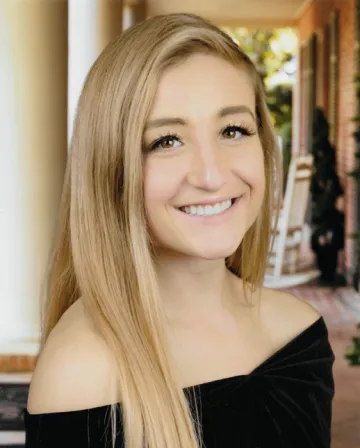
Chelsey Bergmann
Chelsey Bergmann is a Junior at the University pursuing a Bachelor of Science degree in Computer Science with a minor in Spanish. Chelsey is originally from Wisconsin and has really enjoyed participating in HackArizona where she and her team created an AI named Annette to improve the job seeking and recruiting process using Java and JavaFX. Chelsey is currently working as an Undergraduate Research Assistant in the development of an app that uses guided imagery to help those with feelings of loneliness or depression as a result of COVID-19 or other distressing situations.
In an interview with Arthur Jordan, Chelsey shared her experience in the CS department:
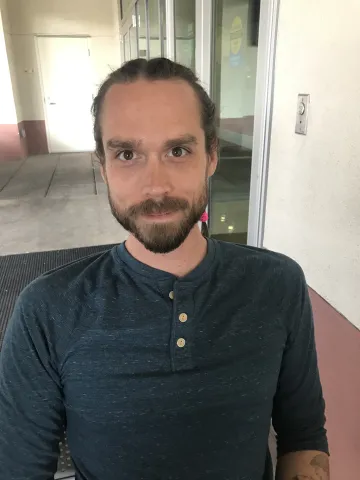
Graham Walker
Graham Walker is originally from Eugene, Oregon. Graham attended Pima Community College before transferring to the UA. Graham has been a CS department tutor (Spring 2019) and is currently serving as a tutor coordinator (since Fall 2019). Graham anticipates completing the BS in Computer Science this upcoming Fall 2020 semester.
In an interview with Martin Marquez, Graham shared his experience in the CS department:
Tell me about the impact CS tutors have on CS students. What do you enjoy about being a tutor? Tutor coordinator?
A CS tutors main goal is to guide students to a place where they can feel confident in their abilities to solve problems. From my own experience, coding can feel very overwhelming in the beginning. Especially if you've had no prior exposure. It can feel as though you're fighting with the language rather than confidently solving the given problem. I think having peers to talk to is generally an important thing to have access to not only for the technical aspects but also feeling like you're part of a group. That group--and the shared experience that comes with it--can be a terrific lifeline and feeling supported is a powerful thing. It's my hope that the tutors help students not only feel comfortable with their CS skills but also comfortable within the department in a more general sense.
What excites you about the field/sub-fields in CS?
One of my favorite courses that I've taken at the U of A has been Cloud Computing. We spent the semester setting up servers, building simple websites, handling cookies and user authentication, and using databases for some simple back end experience. Everything in that course felt very applicable to the real world, and of course it is. Every time you hop on the internet you're interacting with these tools and systems. The prevalence of these systems is also what excites me about the field in a more general sense. That is, there are many options and roads to travel down that you can apply a CS education towards. From game design to the big tech corporations to education and academia, there is bound to be a field that will not only interest you but will also allow you to use your degree in the "real world". And these skills are very much in demand.
What memorable experience have you had in the department?
One of my more memorable experiences was being a part of the academic program review for the CS department. I worked with faculty and a grad student to get a picture of the state of the department. This covered everything from class sizes and departmental growth to gauging the sense of community within the department. The process pulled the curtain back and gave me a more well-rounded glimpse of some of the things the department needs to work on but also what is amazing about it in the first place. While bureaucracy can move like a sloth, it is heartening to know that problems are being addressed and the things that are working well are being leaned into.
Why is it important to get involved in student organizations, research, service, etc. in the department and/or on campus?
I think it's very important to get involved in the department in some capacity. The main reason being a sense of ownership and belonging. If you plug in and engage with the department and your peers you will inevitably feel more comfortable. You might do it for pragmatic reasons like networking and building soft skills but the real payoff is feeling like you've made a home for yourself. This is purely anecdotal, but it's my view that sometimes our more human side can get lost in our pursuit of technical skills. I would argue that working on "people skills" is just as valuable as the CS education itself as they will benefit almost every facet of your life, personal and professional. There are also many different ways of getting involved. You might find a student position (tutor or TA, etc.), join a club, become a mentor, or just simply talk and engage with your peers. If people get involved I think they'll feel a great sense of fulfillment in supporting others as well as feeling supported themselves.
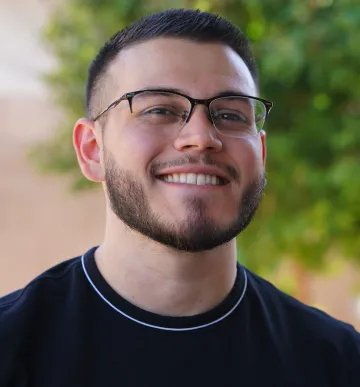
Adrian Bao
Adrian Bao is a Tucson native and attended Pima Community College before transferring to the UA. Adrian will be doing a virtual internship with Amazon this summer and plans on graduating Fall 2020 with a BS in Computer Science.
In an interview with Martin Marquez , Adrian shared his experience in the CS department:
What excites you about the field/sub-fields in CS?
Response: One of the things I wasn't aware of when I initially became interested in Computer Science was the vast number of specialties or emphasis you can choose from when going into industry. It's amazing that a degree in Computer Science can allow individuals to work in a wide variety of fields such as Front end, Security, Embedded Systems, AI, the list goes on! I was excited at the opportunity to explore the different sub-fields through the courses provided at the UofA and I discovered my desired emphasis through a combination of coursework for Cloud Computing (CSC346) as well as my internship at CyVerse. The projects I got to work on and the technologies I got to use in both of those experiences were fascinating and I always continued to explore beyond the scope of the original projects. Additionally, I was looking for a specialty where I can make an impact with the software I would work on. Given that cloud & edge computing are booming right now, I realized that my contributions in the cloud-based industry would help make a significant impact on the users. It took a while to figure it all out but through some trial and error these past couple years, I am excited I have finally found my specialty within CS.
What memorable experience have you had in the department?
Response: HackArizona 6.0 this past January was so much fun. It amazes me that a student-led event like that can bring so many people together from various Universities and provide opportunities to connect with fellow technology-enthusiasts and employers for an entire weekend. This was my second year attending HackArizona, however, it was the first time I had a team intent on building something cool over the weekend. We went in light hearted, coding for the fun of it and enjoying the weekend but we realized on the second day that what we had planned out as a project was actually pretty cool and might garner some attention. Too many Red Bulls, pizzas, and a 23-hour coding sprint later, we submitted our project on Sunday with only an hour to spare before demoing it to sponsors. Sponsorship demos was one of my favorite moments of the entire weekend. Not only did we get to meet fellow students and learn about the awesome stuff they built but when speaking with the sponsors and seeing the excitement on their faces when demoing our project, our team was encouraged and motivated at the positive feedback we were receiving. It just goes to show that attending the event with an open mind can lead to completing an exciting project that receives recognition. The entire HackArizona experience is incredibly rewarding, regardless of what you choose to participate in. I salute the Computer Science students that organize the event because they provide us, as participants, opportunities to connect with employers and gain experience working on a project to professionally demo to sponsors interested in your development. I am glad I got to participate in HackArizona and highly recommend it to any Computer Science student.
Tell us about your internships with CyVerse, Garmin. Why are internships important?
Response: I transferred to the University without any technical experience on my resume, which worried me a little bit. In my first meeting with Arthur Jordan, he recommended I start looking for opportunities as soon as I can stating that internships provide valuable experiences that help expand your interpersonal, collaborative, and technical skill sets. I took his advice and immediately started hunting for internship opportunities on Handshake, which is where I found CyVerse. As this was my first internship, imposter syndrome jumped in and I was intimidated thinking I wasn't prepared for this type of job. However, from day one, they made it clear that an internship is a learning experience and that they would provide any support I needed throughout the duration of the internship. I was excited at the opportunity to work on cloud-based software and with every passing day, I realized that CyVerse helped me discover my passion within Computer Science. Given that they are located on-campus, I have been fortunate enough to remain with the company since I started back in January of 2019, working during the Fall and Spring semesters. During the summers, they have been supportive of me exploring experiences at larger companies such as Garmin (Summer 2019) and now Amazon (Summer 2020), which interestingly enough, were both obtained by applying on Handshake! While working at Garmin, I had the opportunity to observe what it's like to work on an international team with a highly active production pipeline. Additionally, this is where I learned a crucial point, never be afraid to ask for help. As an intern, you might feel insignificant or afraid to bother the full-time engineers with your intern work, but that is totally not the case. They were in your shoes once and value your contributions as an intern. Reaching out to your team, however large it is, can show them you invite collaboration and open to discussion with others. The standard path of just getting a degree and graduating can get you quite far, however, exploring internships early on can really make an impact on your technical and interpersonal skills and gain the attention of recruiters. Not only does it give you an inside look at what it's like to work for a specific company but it also helps you gain priceless skills through a wide variety of experiences. I view internships as a bridge between a college degree and industry. They help you establish a strong foundation, build connections, and prepare you for industry as a Software Engineer or Program Manager.
What surprised you most when you transferred to the UA?
Response: I transferred from Pima Community College where the standard class size for a Computer Science course was roughly 20 or 30 students, max. Coming into the University and taking CSC120 blew my mind with how many students were in the class. I came from an environment where it was easy to just walk up to the professor and ask them a question about some bug in your code but I quickly realized that was not the case at the University. Fortunately, office hours, the TA's and Tutor's were all great resources early on that helped me get acclimated to the University. Another thing that surprised me when I transferred was the number of opportunities available to students to connect with employers or learn about internships/jobs. STEM-oriented Career Fairs, Handshake, HackArizona and even the weekly job listings added to the Computer Science Newsletter all provided opportunities that I didn't quite have at the Community College level. I am grateful for the resources provided by the department that helped make my transition to the University much easier.
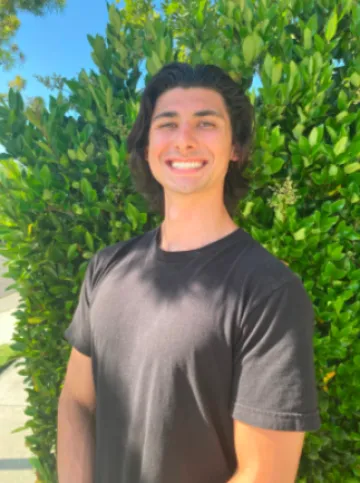
John Kounelis
John Kounelis is graduating this spring with a BS in Computer Science and minor in math. John will be returning to San Diego, where he grew up, working as a software engineer for BAE Systems.
In an interview with Martin Marquez, John shared his experience in the CS department:
Response: Just within my lifetime, I've seen how computer science has helped completely transform the way the world operates and how people
interact. Whether it's for better or for worse, it's certainly
exciting to be a participant in the field and at the cutting-edge of
solving the problems of the digital age.
2) What memorable experience have you had in the department?
how many hours we dumped into getting it all to work, but it was a lot
of fun.
3) What advice would you give fellow transfer students?
in the advising office, get involved in research, or whatever you can
do. It's the best way to get connected with your department and other
students and can lead to more opportunities down the road.
4) How can a student develop a connection with their peers?
involved! Also, if you hang around the Gould-Simpson Atrium enough you
can easily befriend the "locals."
5) What do you enjoy about being a UGTA? Course coordinator?
on something they were struggling with (particularly if it is
something I struggled with when I took the class). An added bonus of
being a Course Coordinator is that students tend to look to you for
advice with other things (what other CS classes to take, advice on
getting an internship, etc), which I enjoy because I get to help them
with things beyond the classroom.
6) How did doing an internship help you get your job with BAE Systems?
meeting with the college hire manager who offered me a full-time
position. Like many companies, BAE Systems sees internships as an
interview process in and of themselves because they get to see how you
operate while working in their environment.
7) What are you looking forward to the most in your new job?
and learning not only more technical skills, but the skills necessary
to succeed in industry.
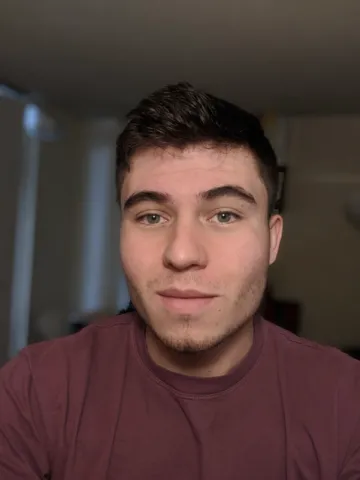
Matthew Romero
Matthew Romero will be graduating this spring. Matthew will be earning, with honors, the BS in Computer Science with a mathematics minor. Originally from Winslow, Arizona, Matthew developed an interest in computer science at a young age. After graduation, Matthew will be moving to the bay area as part of Google's Engineering Residency Program.
When asked about the interview process for Google's residency program, Matthew answered:
Response: The whole interview process consisted of 7 rounds beginning in September 2019 and ending with an offer in December. Throughout the entire process, I was a nervous wreck. After each interview I would feel terrible, thinking that I just blew my chances. I was assuming the worst over the entire 3 months, which was really unhealthy for my mental health. Despite this, I felt like I needed to prove to myself that I could see it to the end. I wanted to make both myself and my family proud. So, I would tell myself that as long as I try my hardest, there is no reason to be disappointed. I knew that even if rejection did come, it wouldn't be the end of the world, or mean that I am less of a programmer. By taking a more stoic approach, I was able to cope with feelings of uncertainty. I am sure that many of us have experienced just how competitive the industry is nowadays. With that said, it is important to remember that failure does not define you or "place" you in a certain tier of programmers. I failed at many other interviews during all stages of my college career and would go through periods of stress and frustration as a result. Just remember to shake it off in a healthy way and continue to push towards your personal end goal.
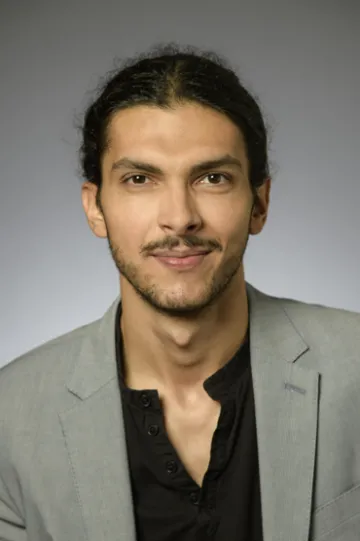
Omar Gebril
Omar R. Gebril is a senior computer science student. Omar is from Cairo, Egypt and became interested in computer science as a result of participating in a robotics engineering camp.
When asked to recount a memorable experience in CS, Omar answered:
Response: The whole journey from start to end is a memorable experience of its own. I mean, the most unforgettable to me personally is the countless number of long nights spent programming and pacing around my room trying to get my code right before the deadlines. I assure you the word "countless" is an understatement. However; the all-time most epic experience ever related to our department is definitely going to the HACKATHON! Even if you're not trying to submit projects, it's so much more than worth it to go talk to the sponsors' representatives and meet people. Trust me, if they're at a hackathon, they have to be interesting.
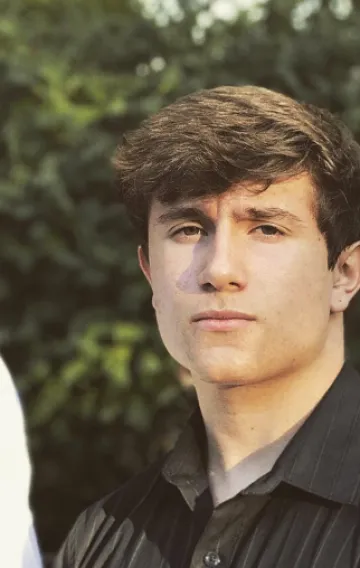
Nick Rizzo
Nick Rizzo is a first year pre-computer science student. Nick is originally from Indiana and decided to attend the University of Arizona because of many reasons including great weather, scholarship opportunities, helpful advising, and job prospects.
When asked to provide advice for incoming CS students, Nick answered:
Response: Do more than what is required, CS is a very big field and there is always something more to learn. When you aren't doing classwork, work on learning another language, another library, or another technology. Employers love to see that you know how to use the technologies they use, it will make your github account look really good, and it will make you better at coding in general.
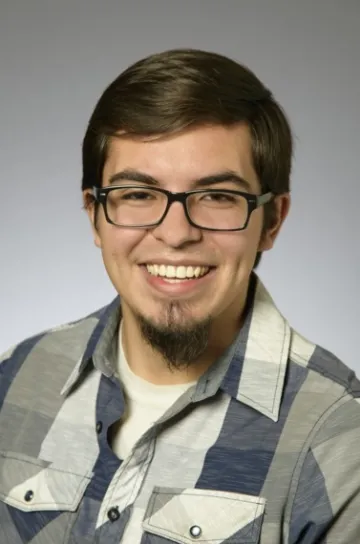
Angel Aguayo
From Arthur Jordan: It has been a pleasure working with Angel throughout his time here in the Computer Science department. I first met Angel in my role as an Undergraduate Academic Advisor where I was able to help him navigate University policies and procedures and he has made it a point to be actively engaged in the department through various roles. Angel has continuously demonstrated persistence, resilience and perseverance despite various personal and academic challenges; meanwhile, he has given back to his computer science peers through section leading and his time as an undergraduate TA. Angel is constantly reflecting on his experiences to better himself and this is very clear in his personality and his self-confidence; I am excited to see the impact that Angel will have in his role at Google.
Question: Tell me a little about yourself and how you started off in Computer Science.
Response: My name is Angel Aguayo and I am a Computer Science major and I was also a Mathematics major up until last semester, but I changed my Mathematics major to a minor when I realized that I wouldn't be able to complete the requirements in the same time frame as my Computer Science requirements. My interest in Computer Science started at a really young age because I was always interested in computers but my family neither had computers or internet growing up. During elementary school I would join as many clubs as possible that involved technology; the most significant club was in 5th grade where we did the Techno Squad and worked with different recording software, PowerPoint, etc. This got me really excited about technology in general and come high school there was an introductory programming course in QBasic, which my friend and I instantly hopped on. As a Senior in high school I didn't know what I wanted to study in college, but I had been involved in band since the 5th grade so I thought I would go ahead and study music. Upon entering college, I auditioned to play flute and I got accepted but it didn't feel like the path I wanted to pursue; I ended up meeting with the Advisors a couple weeks before the start of the semester and changed my major to Computer Science.
Question: What has been the biggest challenge as a Computer Science student?
Response: I really enjoyed CSC 110 and 120 and determined that Computer Science was the perfect major for me to pursue alongside math, but at the end of my sophomore year I was hit with an episode of depression that put me behind in my math courses. At that time, I was in CSC 335 and 345 and lost motivation halfway through the semester and was attending fewer and fewer classes. One of the biggest obstacles I've experienced is a lack of motivation in general; at the beginning it was really hard to tough it through and try different things to figure it out. I was not used to failure and it severely hindered my growth, but I feel that it was a learning experience in the way that I finally realized the benefits of going to office hours. This realization gave me confidence and motivation to be more involved with the department and helped me to secure internship opportunities.
Question: What has your Career Development looked like as a Computer Science student?
Response: At the beginning of my sophomore year I started to think more about my future and started attending the various career fairs on campus where I could interact with individuals in the industry. This led me to speak with representatives at State Farm, which is how I was able to secure my first internship with them. During this time, I also spoke with Microsoft and applied for the Microsoft Employer Program where I went through a series of phone interviews, in-person interviews, whiteboard' interviews, etc. Eventually I was brought on-site to interview, which went terribly because after each round' I left feeling that I did not perform well. After being rejected by Microsoft I received an offer with State Farm to intern over the summer and found it to be a very wonderful experience for a first internship. After my time at State Farm I wanted to aim bigger and secure an internship with Microsoft for the following summer. During the fall career fair, I was able to land interviews with Sandia National Laboratories, Google, Microsoft, and Hexagon Mining; I ended up securing two competing offers with Sandia and Hexagon Mining. Through a series of unfortunate events I was not able to participate in either experience but was able to secure an internship with N P Photonics. At the conclusion of my Junior year I started looking ahead to finding full-time employment where I secured interviews with Raytheon, NSA, Google, and Microsoft. While I was going through the Google and Microsoft application process, I took a lot of time to practice questions through LeetCode and went into my interviews more prepared. I remember working with my biology lab partner on a lab report and getting an email from Microsoft extending a full-time offer and I couldn't be happier. I didn't accept the offer right away because I was finishing up my final rounds of interviews with Google and needed an extension; after about two weeks I was in the atrium waiting for a class to start and I got a phone call from my Google recruiter extending an offer. In the end, I accepted the offer with Google despite Microsoft being my dream company' because my gut was telling me to go with their offer. It was an incredibly humbling experience to reflect on my journey and starting off with no access to a computer or internet and struggling with courses and mental health, which would eventually lead to success in the way of solidifying an offer with Google.
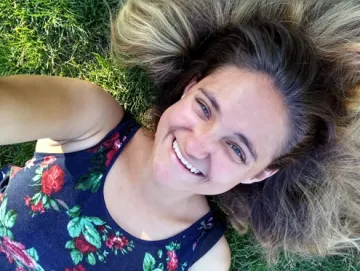
Kapua Ioane
Kapua is a first year pre-computer science student. Kapua was born and raised in Tucson and graduated from Amphitheater High School. Kapua recently accepted a paid internship experience with Axon for this summer.
When asked to provide a study tip/advice to her peers, Kapua answered:
Response: My best study tip for peers in Computer Science is to start projects early, we can listen to all the lectures and workshops, but our skills develop during assignments, the application of the tools given to us is what makes us learn. To the peers I have in general, find that mode in which you study best, and exploit it as much as possible. For me, it's in a busy environment (like the union, mall or a cultural center) with instrumental upbeat music."
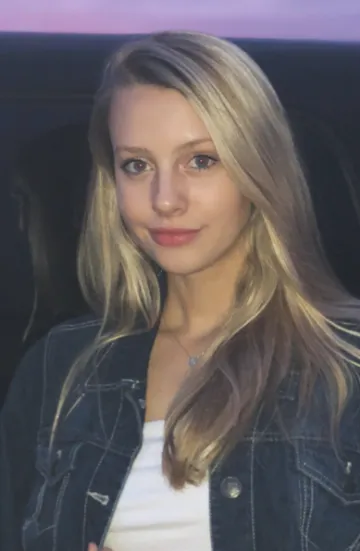
Reagan O'Grady
Junior pursuing a Bachelor of Arts Degree in Computer Science and a minor in Information Science, Technology, and the Arts (ISTA).
What suggestions do you have for students doing online coursework?
Response: Creating a consistent weekly schedule can help manage one's time and help with keeping up with all the lectures and home works being put out. I think one thing I constantly struggle with is creating unreasonable tasks for myself. I'll plan to wake up at 7am to crank out a few assignments, but I'm totally a night person and I usually end up sleeping through the 20 alarms set. That being said, creating a reasonable schedule that works around the times that you feel most productive is definitely key. Also, take lots of notes!

